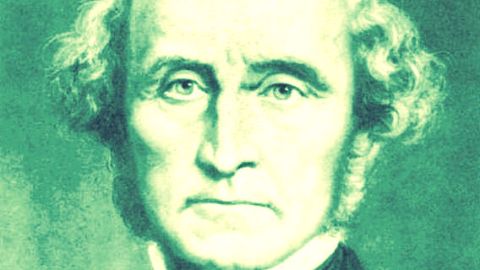J.S. Mill’s Case Against Extreme Lifehacking

If you’ve spent some time online over the past decade, you are probably familiar with the concept of the “life hack”: a nifty trick or tip to help you live your life more efficiently and ingeniously. Links to life hacks litter Facebook newsfeeds and populate those tempting little “MORE STORIES” boxes at the bottom of web pages. Who wouldn’t want to find out an easy way to get rid of fruit flies, fold a fitted sheet or remove the haze from car headlights?
I don’t want to knock life hacks too hard. I’m partial to this one:

It actually works! This tip has also proven useful:

There’s really no harm in picking up on someone else’s insight to keep your paint can neat and clean. But there can be a dark side to trawling the Internet for advice on how to live a cleaner, quicker, smarter life, especially when the pursuit edges into its bigger cousin: emulating famous successful people.
The target of the macro life hack varies. Jack Dorsey, a co-founder of Twitter, took exceptional pains to live his life in the mode of Steve Jobs. Last year, less dramatically, Tim Goesslin devoted a day of his life to living like Ben Franklin, using this daily schedule as a guide:

Mr. Goessling says living like the founding father for 24 hours was a life-changing experiment: “It made me examine not just HOW I was spending my time, but also WHY, which is something, in my opinion, that we never think about enough.”
I don’t want to begrudge Mr. Goessling his seance with Ben Franklin’s ghost, and there is something to be said for standing on the shoulders of giants, but trying to give over one’s life to that of another person is not necessarily a worthwhile, or humanity-affirming, goal. It is certainly no prescription for living a life of individuality. In his 1859 book On Liberty, John Stuart Mill is lucid on that message:
No one’s idea of excellence in conduct is that people should do absolutely nothing but copy one another.
Leave the Xeroxing, Mill insists, to the copy shop. “He who lets the world, or his own portion of it, choose his plan of life for him, has no need of any other faculty than the ape-like one of imitation.” The man who “chooses his plan for himself,” by contrast, “employs all his faculties.” The full use of one’s reason, judgment and creativity must take precedence, then, over swallowing and adopting even the niftiest of life hacks:
Among the works of man, which human life is rightly employed in perfecting and beautifying, the first in importance surely is man himself. Supposing it were possible to get houses built, corn grown, battles fought, causes tried, and even churches erected and prayers said, by machinery—by automatons in human form—it would be a considerable loss to exchange for these automatons even the men and women who at present inhabit the more civilised parts of the world, and who assuredly are but starved specimens of what nature can and will produce. Human nature is not a machine to be built after a model, and set to do exactly the work prescribed for it, but a tree, which requires to grow and develop itself on all sides, according to the tendency of the inward forces which make it a living thing.
Automated military, construction and agricultural equipment? We’re there, 150 years after Mill wrote his essay. We’re even on the cusp of automated prayer, for goodness sake. We’ve turned tasks formerly completed through human strength and ingenuity over to technology, with decidedly mixed results. But we ought to resist programming ourselves still more thoroughly with proxies for individual thought and effort. The tree analogy is instructive. Rather than life-hack our way into the role of a copycat or automaton—separating eggs and warming up food in the microwave in just the ways the Internet instructs—we should regard ourselves as trees rooted in a particular soil but free to grow every which way we exert our wills.
Mill took his own advice, conforming to few conventions of his age. He was an atheist who refused to accept the teachings of the Church of England and was thus shunned from both Oxford and Cambridge. He carried on an intimate relationship with a married woman, Harriet Taylor, for over two decades before marrying her following her husband’s death. He stood up for women’s rights and deviated from his father’s flat-footed brand of utilitarianism to offer his own, more nuanced theory of higher and lower pleasures.
So before you click on another list of “31 Life Hacks You Must Learn Today,” consider setting your own creative and intellectual prowess to a task. And rather than devote your life to copying founding fathers or tech CEOs, consider showing the world, and yourself, who you are. (And no, not just because J.S. Mill says so.)
Image credit: Shutterstock





